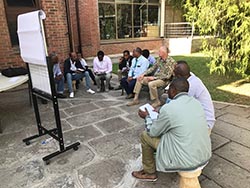 Policy workshop Ethiopia 3 May 2019 |
N2Africa organised two policy advocacy activities in Tanzania and Ethiopia, between October 2018 and May 2019. Following the policy recommendation workshops in Addis Ababa on 3 May and in Iringa on 8 May, the two policy recommendations reports are now finalised, and follow-up activities by the N2Africa country coordinators are ongoing. In Tanzania there is much interest by politicians to support soyabean for livestock production. |
As the project was coming to an end mid-2019, N2Africa organised a policy advocacy activity in Ethiopia and Tanzania. Policy recommendations would encourage government and development partners to bring N2Africa results further by paying more attention to the economic, environmental and nutritional potential of the legume sector, while addressing some of the constraints experienced along the value chain, and in the organisation of the sector as a whole. (See N2Africa Podcaster 56)
In May 2019, draft policy recommendations were presented and discussed in two half-day policy workshops. Using the workshop feedback and incorporating more of the N2Africa yield results, the two policy recommendations reports have been finalised. (See N2Africa reports no 122 and 123)
In Tanzania, N2Africa Country Coordinator Freddy Baijukya (IITA), in partnership with Southern Agricultural Growth Corridor of Tanzania (SAGCOT) continued the policy advocacy work, focusing first of all on soyabean, as source of plant based protein for manufacturing livestock feed. Baijukya explained: “We were requested to be more specific on the issues we are addressing and target a specific sub-sector. We then identified the shortage of plant-based protein as a source for animal feed, and this became an entry point to promote soyabean. So we developed a policy brief in that direction, targeting the Ministry of Livestock Development which will be tabled to parliament in December 2019.” Moreover, Baijukya is in the process of developing another policy brief on the fortification of maize flour with soyabean flour for the use in school feeding programs, this time targeting the President’s Office, Regional Administration and Local Government who are in charge of primary education.
N2Africa Country Coordinator Endalkachew Woldemeskel pointed at the new National Pulse Sector Strategy and Plan of Action 2019-2024, for which he was consulted. The strategy was launched on 3 September 2019 by the Ministry of Agriculture. The involvement of private sector and exporters in this strategy clearly strengthened the focus on public private partnerships, the enabling business environment, and the coordination of the pulse sector in Ethiopia – in line with some of the recommendations of the N2Africa workshop. Meanwhile, the Business Development Officer for N2Africa, Edward Baars, together with Paul Ingenbleek of WUR, developed a project proposal for the development of input- and output markets for soyabean in Ethiopia, Tanzania and Uganda. Baars explained: “We want to strengthen the agricultural marketing system, by using ICT-platforms to overcome information asymmetries in markets, developing bundled input markets, and using existing maize input delivery infrastructure for soyabean input market development.”
Ferko Bodnar, who coordinated these policy advocacy activities with the N2Africa country coordinators, will try to track to what extent N2Africa’s broader experiences in general, and the policy recommendations in particular, are finding its way in new government and development partner’s policies and strategies in Ethiopia and Tanzania.
Ferko Bodnar, Agrevalue, The Netherlands
